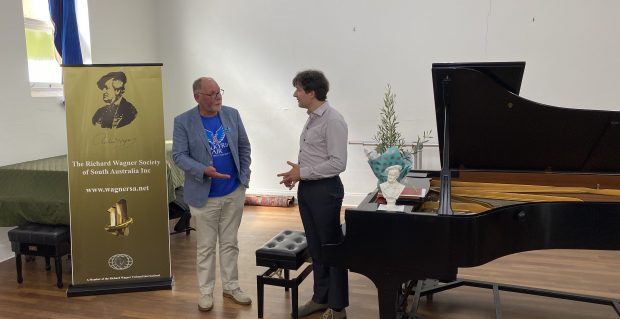Wagner in Russia

13 February 2021: The Wake for Wagner
The Richard Wagner Society of South Australia hosted Konstantin Shamray, an expert pianist and musicologist, for a stimulating and enjoyable lecture on Russian Wagnerism (see main image, Konstantin in conversation with Society President Geoffrey Seidel). Wagner gave six concerts in St Petersburg in 1863, conducting excerpts from Der fliegende Holländer, Tannhäuser, Lohengrin, Tristan und Isolde, Die Meistersinger, Die Walküre and Siegfried. His ‘rock star’ presence ensured a wild commercial success, but as Mr. Shamray explained, critical reaction was mixed, particularly among the Russian composers, whose initial adulation morphed into a local set against “disgusting chromaticism,” a surfeit of colour, foreigners, and what was perceived to be the ‘Cult’ of Wagner.
Composers such as Mussorgsky and Borodin heard but did not listen – they were off on their own wavelengths. Tchaikovsky was initially an ardent admirer, then changed his mind, “disgusted.” Alexander Serov was a card-carrying fan but this led to frosty relations between him and the Great Five. Perhaps this was due to what Harold Bloom has described (in another realm) as the ‘Anxiety of Influence’.
But our illustrious speaker had two intriguing exceptions, which he demonstrated on piano with exceptional dexterity and ingenuity. Rimsky-Korsakov was an admirer, especially of Wagner’s genius at orchestration, and of The Ring. Some of his works show clear signs of the German’s hand: the two-chord progression and inversion combinations that obtain from Die Walküre and Rheingold appear in Tsar Saltan and the Legend of the Invisible City of Kitezh, for example.
And Alexander Nikolayevich Scriabin, born after Wagner left Russia for Vienna, pockets bulging, was also significantly influenced, his Symphony Number 1 an example, as well as the 8th sonata. The Wagnerian continuum, replete with ellipses, in almost a recurring leitmotif structure, predominated, albeit with those quintessential Russian sub-dominant chord sequences (Don Robertson, in his 2005 essay on Scriabin, wrote: “It was probably Liszt who began freeing ninth chords as seventh chords had been liberated before, and this inspired Wagner who used them freely. Wagner inspired the French composers who began using straight ninth chords. From this base, a number of French composers began experimenting with even higher notes of the harmonic series. Most of these composers are unknown today, and only Debussy succeeded in introducing a new music to the Western world using chords of the ninth and beyond. However, there were two composers who developed music harmonically beyond the 9th chord. The other was Scriabin, who went beyond Debussy in his explorations and brought to us the first music from astral dimensions, music based on these higher partials. Which pieces of music? Works from later in his life: The 8th and 10th Piano Sonatas.“
Nevertheless, Wagner did not “take” hold in Russia for a long time – the Revolution had a seismic effect on art (Lenin’s dictum: “Art…should be understood for the masses,” became Stalin’s ‘art must be understandable‘ – i.e., palatable to the Party and to socialist realism – i.e. palatable to Stalin). And then WWII, especially the Battle of Stalingrad, put paid to any German music for much of the twentieth century. Late 20C revivals were wobbly, due to lack of practice and a paucity of singers with the necessary method, showing how fragile culture can be, and how knowledge of and access to canonical works can drift away with the vagaries of history.
All in all, this was a richly entertaining presentation, though it went somewhat over this correspondent’s head – I hope this small piece has done it a measure of justice. Certainly, Richard Wagner would have paid attention with appropriate appreciation.

Leave a comment...
While your email address is required to post a comment, it will NOT be published.


0 Comments